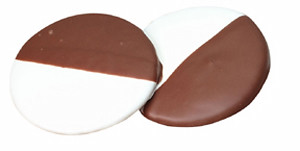Look to the cookie!
Hark! Dear readers, I'm glad to finally offer you a post on this here lawblog, concerning original legal controversy, that may actually stir some legal debate. Consider the following fact pattern:
Person 1 approaches a vending machine and puts in the required money for a delicious looking cookie. However, as rotary driven coils are wont to do, the mechanism stops short and the cookie fails to drop. As it floats suspended in air, Person 1 is understandably dejected. That is, until the entrance of Person 2.
Person 2 approaches and signifies an intention to buy a cookie of the same chocolate chip order, thereby freeing two of the item and delivering one to Person 1. The money inserted, the coil begins to turn, but in a shocking turn of events, the first stalled cookie was in fact, the last one.
Now, I tell you that this is a true story, and also, that in the end I ate the cookie in question. But tell me, was the sub-par taste simply the result of the cookie being stale, or was it the flavor of guilt? That is to say, your answer depends on whom you think I am - Person 1 or Person 2 - and whether I should feel guilty at all, being one or the other.
Additionally, the problem presents a host of legal problems: to whom does the cookie rightfully belong? To Person 1, who paid for it first? Or to Person 2, who had no idea there was only one cookie left and who paid just as much? Was there ever ownership of the cookie? At what point does it become someone's property - when the coils begin to turn or when the cookie drops?
A veritable gray area of legal debate. So I ask you, each and every one of my readers, to weigh in with your thoughts below. (I'll also be counting to see how long it takes someone to bring up a candy lineup.) If I've learned one thing in law school, it's that complex legal debate can be resolved with a few short remarks from strangers.








12 comments:
I think morally they both had equal right to the cookie, maybe even person 2 moreso, since person 1 was already out of luck. But legally I rely on the old latin maxim "nemo dat" to indicate that person 2 can't own it since person 1 already did.
forget Canadian law - let's go with law of the jungle. Fight to the death - whoever wins, gets the cookie.
-Cathy
I think it's a little suspect that person 2 couldn't see that there was nothing behind the cookie that was dangling by one corner of packaging.
From my past experience with vending machines, I think it would be pretty obvious that that was the last one ... which means that either person 1 didn't declare ownership soon enough, or person 2 had intentions to eat that cookie - no matter the cost - right from the get go.
Now I'm no Law student, but I'm pretty sure it says in both the 10 Commandments, and the Constitution, that "possession beith 9 parts out of 10 of ye law" - so I come down on the side of person 2 legally.
Unless person 1 is you.
Knowing the author of this blog fairly well, he is undoubtedly Person 2. The battle for said cookie, between P1 & P2, lasted but mere minutes before P1 simply gave up. You see; the taste of the cookie is not guilt, nor lack of sustenance... but bitter victory. He wanted a battle, he wanted an all out "You can't handle this cookie" war... but all he got was a kind gesture from a stranger. That, and when P2 licked said cookie P1 realized he didn't want it anymore. Cruel... just cruel. But if that's what it takes to survive in this world, so be it. Lick your cookies to show the rest of the world, this cookie is mine.
I guess I taught him well with "The battle of "The last bowl of ice cream" of 1992. Or perhaps it was "The battle for second helpings of spaghetti" in 1994.
Take what vending machine's give you... and you will not go hungry.
Three cheers for the cookie victor!
That last comment was dirty!
- C
Recently at work, despite my guilt at the indulgence, I put in $1.10 to the machine in the hallway for a bag of pretzels. They fell forward and got wedged against the glass of the machine. I ran through the motions of swearing, banging, etc., then put in a second $1.10 to purchase another bag. Despite the time-honoured hope that two wrongs do, in fact, make a right, the second bag fell forward but in doing so only wedged the first bag tighter against the glass, itself becoming cradled on its back until both were literally dangling before my eyes. Further recourse to swearing, banging, etc. proved fruitless: I realized it was time to put my money where my mouth was (or more accurately, where my pretzels weren't) and input a third $1.10. There were about seven bags in the row, and in the fight of man against machine I resolved to buy them all, so tainted was my judgment in this quest for victory in a fight no one can win. Fortunately, the battle sound ended, before I could hurt myself further. Unfortunately, I walked out $3.30 poorer, and with three bags of pretzels to consume.
All of this has little to do with cookies, but I guess the moral of the story is that it's best, when time to round up the Usual Suspects, to make sure you're both person 1 AND person 2. That way, at least one of you doesn't get screwed, and instead of shaking off a fake limp as you walk away, you can eat pretzels.
Unless, of course, there's no other packages behind it in the row. In which case, you're goin' to jail, punk.
Wade
Interesting comments. My hypothesis is this:
Our author is P1. Let me explain...
On the legal side, yes it is tricky. The root of the problem is in the design. Coil vending machines are built with less intelligence than your average coke can vendomatic. In the case of coil machines, it is possible to pay for a product that doesn't even exist, IF it has run out of stock (this is the dilemma our poor author has found himself in). In a can vending machine, a computer tells you when the product of choice is no longer available - change is made, or another drink is chosen. There is seemingly no liability for the machine's service company to reimburse "unlucky" candy lovers.
Getting to my point, P1 should have called the number provided on the machine facade and informed them of the hanging cookie. P1 would have received either a monetary compensation, leaving P2 the sweet sweet....., or P1 would have received the cookie after waiting for a service man to unlodge it, and P2 would have moved on to candy machine n + 1. Either way, P1 would have paid for and received his sugary treat, P2 getting satisfaction from either vending machine n or n + 1. However, in our instance, P2 is out of luck! P2 invested in a product destined to return nothing, and that is exactly what P2 got.
I have a hunch though...Our author is P1 because he has a great girlfriend, who would help pick him up when he's down - even when he's really down, staring into the hollow glass vault that is this candy machine from hell. She bailed him out and he got his cookie. A, your the best!
If the parties cannot agree who the real owner is the cookie shall be cut in twain. Whosoever refuses to allow the severence is indeed the cookies true mother.
Let's get geeked out on this:
The cookie in a machine is not an offer, it is merely an invitation to treat. The price is the offer. Basically, the machine, which is unmoved by your entreaties--whether you swear at it or otherwise--cannot engage in negotiations. Therefore contractually simply displaying a product does not an offer make. It is the price, and the notion that money can be deposited into the machine, that is the offer.
When P1 put money into the machine, the offer was accepted. Since we know from commercial transactions that failure to deliver can be a breach of the contract to the extent that a person is robbed substantially of its entire purpose, P1 could have treated the contract as breached and demanded the return of his money and damages for mental suffering.
But he did not do so.
Now along comes P2. P2 also enters into a contract with the machine, OR SO HE THINKS. Unfortunately for P2 there is a complete lack of consideration in his contract since there is no cookie. Rather foolishly he chooses to buy the cookie anyway, entering into a contract that is void ab initio. Therefore the cookie can only belong to P1, who did not treat the contract as repudiated.
P2 is clearly a little silly.
Only a lawyer would not offer to split the cookie.
Brad
p.s Haha...
I find myself compelled to post my opinion, as this is such a serious problem. I believe our author to be P2, but I think that the rightful owner of the cookie to be P1. Ownership comes with payment, so despite the fact that P2 RECEIVED the cookie, it does not make him the rightful owner as P1 paid FIRST. But any self-respecting human being would have offered to split the cookie, or give it to the person who paid first and go away knowing that they are a GODD PERSON. Quite a debate...you should bring it up in class R. Hahaha.
Jodie
In this case P1 entered into a K for specific goods so ownership passed upon payment. When P2 came along he signified his knowledge that P1 was the rightful owner of the cookie so is not protected as a 3rd party without notice. Therefore, the cookie rightfully belonged to P1.
Post a Comment